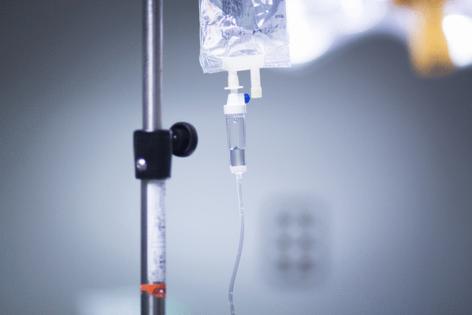Florida hospitals face IV fluids shortage after hurricanes disrupt supply chain
Published in News & Features
Florida hospitals and health providers are coping with a national shortage of IV fluids exacerbated by the two major hurricanes that have hit the Southeast in the past month.
Hurricane Helene damaged the Baxter International Factory outside of Asheville, N.C., which makes about 60% of the U.S. supply of fluids, and Hurricane Milton caused the temporary closure of the Daytona Beach plant of B. Braun, maker and distributor of a fourth of the nation’s IV fluids.
The disruptions have left Florida hospital systems — like those throughout the US — rationing fluids to make supplies last longer. No one knows at this time how long the shortage will last.
Mary Mayhew, president and CEO of the Florida Hospital Association, said hospitals in the state are trying to preserve every drop of IV fluid and haven’t hit a crisis level yet.
“Our hospitals have done a great job managing their inventory so that this does not affect patient care, at least in the short term,” she said. “Now there are smaller hospitals that may not have the same level of inventory or the financial resources to pay potentially higher prices to to go to another supplier. So there have certainly been some areas of concern with smaller hospitals.”
In Florida, healthcare providers are conserving their dwindling supplies of IV fluids and taking measures such as giving some patients Gatorade or Pedialyte to stay hydrated and temporarily refraining from discarding IV units that still have some fluids left in them when a patient is transferred. So far, the hospitals have not postponed elective surgeries like hip or knee replacements, a solution implemented in some parts of the country, although the possibility is included in some hospital’s longer-term supply management plans.
Mayhew said Florida hospitals are reporting they are okay — for now. “That has been the recurring theme … if this persists in two weeks, it will be more problematic.”
Baxter has been limiting its customers to 40% of their typical supplies. On Wednesday, the company increased the allotment to 60%.
“That adds relief,” Mayhew said.
National efforts underway
On Monday, the American Hospital Association urged President Biden to take immediate action to increase the supply of IV solutions for the nation’s hospitals, health systems, and other healthcare providers and declare a national Public Health Emergency.
“Patients across America are already feeling this impact, which will only deepen in the coming days and weeks unless much more is done to alleviate the situation and minimize the impact on patient care,” wrote Richard J. Pollack, president and chief executive officer of the American Hospital Association.
There’s also concern about dialysis patients who get at-home IV treatments. Baxter’s North Carolina plant is considered the largest U.S. manufacturer of fluids for home dialysis,
In the hospital setting, the saline, dextrose, and sterile water fluids that the Baxter plant makes are used to hydrate patients before surgery and are often mixed with nutrients or medications, including chemotherapies. IV fluids are also used in neonatal units for infusions for premature babies and for traumas, such as people who arrive at ERs in septic shock.
On Wednesday, the U.S. Food and Drug Administration responded and authorized shipments to be airlifted from overseas plants into the United States to ease shortages of IV bags. However, he also informed hospitals that in the coming weeks, supply may continue to be constrained.
Florida hospitals react
Florida hospitals sent the South Florida Sun Sentinel written statements when asked how the shortages affected them.
“I can tell you that we have what we currently need,” wrote Louis Lochte, communications director for HCA East Florida Division. “We’ll continue to monitor the situation, and we have contingency plans to help ensure we maintain adequate supplies.” Lochte did not respond to a request for details on the contingency plan.
Memorial Healthcare System’s statement reads: “We are aware of the disruption to intravenous (IV) fluids manufacturer Baxter International and are closely monitoring the situation. We are also proactively exploring alternative suppliers for IV fluids, so our supply levels remain stable and all medical procedures continue uninterrupted.”
Tenet’s Palm Beach Health Network spokesman said he would not provide any comment.
Dr. Graham Carlos, a pulmonary and critical care physician at Indiana University School of Medicine, said he is part of a team with the American Thoracic Society that tries to educate the public and medical providers about handling supply chain problems.
Carlos said hospital staff are being warned to be conservative with IV fluids and, when possible, use oral hydration. In some scenarios, doctors may have to use feeding tubes to hydrate patients, which is not a preferred method.
If Biden were to declare a public health emergency, it would allow hospitals to prepare sterile IV solutions in their own pharmacies. “Of course, certain hospitals would be in a better position than others to do that,” Carlos said. It would also allow hospitals to extend the shelf-life of IV solutions that are beyond or nearing their expiration date.
Carlos said his organization is preparing best practices in IV fluid conservation strategies to distribute to hospitals. Some hospital leaders have said they expect the IV fluid supply disruptions to be a “long-term issue.”
Meanwhile, HHS’ Administration for Strategic Preparedness and Response is helping Baxter with infrastructure repairs to the North Carolina plant. In a letter to healthcare providers on Wednesday, HHS Secretary Xavier Becerra said the FDA will continue working with Baxter to identify both potential products already in their system and alternative manufacturing sites, including for potential temporary imports. Adding a bit of optimism, Becerra wrote: “We will be in close contact in the coming days.”
______
©2024 South Florida Sun Sentinel. Visit at sun-sentinel.com. Distributed by Tribune Content Agency, LLC.







Comments